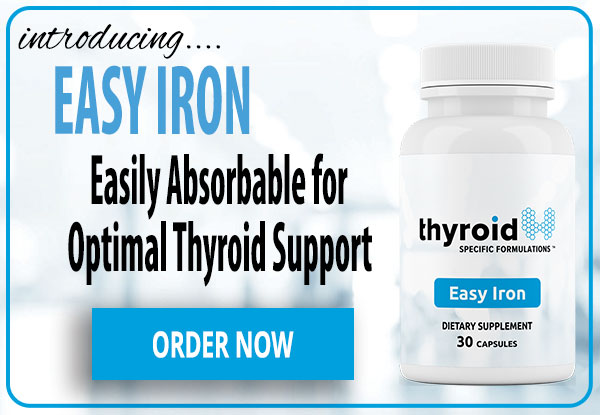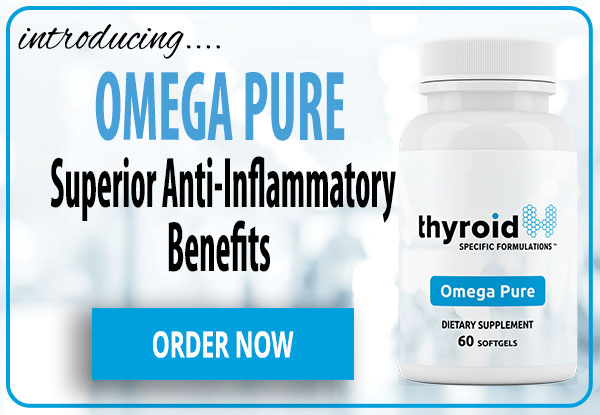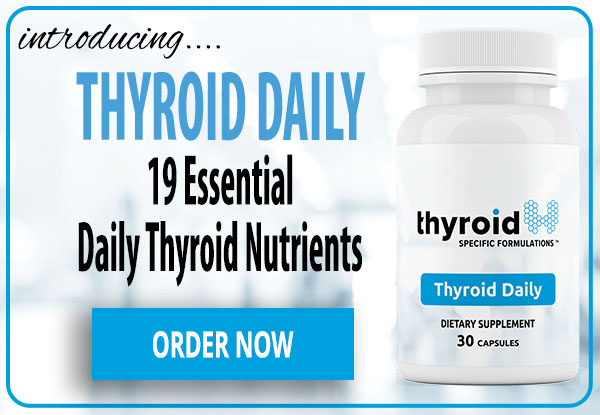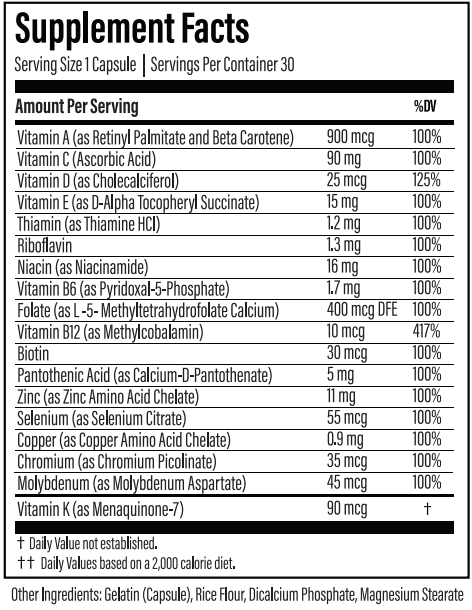Recently, we’ve been rolling out an entirely new line of thyroid-specific supplements for people to enjoy. The one I want to profile today for you is called “Thyroid Daily,” and it is absolutely one of my favorites. Why? Let me explain…
- Have any questions?
- 480-767-9018
- support@in-goodhealth.com

Easy Iron: Best Way to Raise Your Iron Levels
March 7, 2022
Omega Pure: Natural Immune Support You Can Always Count On
March 21, 2022
Easy Iron: Best Way to Raise Your Iron Levels
March 7, 2022
Omega Pure: Natural Immune Support You Can Always Count On
March 21, 2022Home > Hormone Reset > Thyroid Daily: A Thyroid-Specific Multivitamin That Works
Thyroid Daily: A Thyroid-Specific Multivitamin That Works

Product Recommendation: Thyroid Daily is the first complete micronutrient support supplement made for the specific needs of those with thyroid disease. It contains 19 Thyroid Daily essential nutrients, all of which are available in various dosages and different chemical forms. Click Here
Table of Contents
Thyroid Daily: The Essentials
Thyroid Daily: What About The Daily Reset Pack?
Comprehensive Micronutrients For Thyroid Disease
Thyroid Daily: Ingredients
Specific Micronutrients For Thyroid Disease
Thyroid Daily: Directions
What Doesn’t Thyroid Daily Contain?
Supplement Facts For Thyroid Daily
Thyroid Daily: Side Effects
Thyroid Daily: Cautions
Supportive Strategies For Thyroid Health
Resources
Thyroid Daily: The Essentials
Thyroid Daily is the first complete micronutrient support supplement made for the specific needs of those with thyroid disease. It is engineered to be safe for all adults with thyroid disease in a one pill, taken once daily, format (to reduce daily pill count).
Overall, it contains 19 essential nutrients, each of which are available in various dosages and different chemical formats. The form and dosage for each nutrient were carefully chosen to be safe, and helpful, for people with thyroid disease.
In short, Thyroid Daily is necessary to improve all thyroid symptoms and conditions!
Comprehensive Micronutrients For Thyroid Disease
Taking a step back, we should have a quick conversation about micronutrients. Specifically, the micronutrient requirements for thyroid disease, which include:
- Iodine – Those with thyroid disease benefit by avoiding all extraneous sources of iodine.
- Folic Acid – People with thyroid disease often have MTHF-R gene variations, which makes it harder for them to metabolize folic acid into folate in a safe way.
- B6 – Synthetic B6, in the form of pyridoxine hydrochloride, can raise the risk of neurologic side effects.
- Megadose B Vitamins – Nausea, bloating, and anxiety are common side effects from B vitamins far above the recommended dietary intake (RDI).
- Thyroid Daily contains doses within RDI ranges for all B vitamins.
- Manganese – In excess of 2 mg per day, manganese may slow thyroid function.
- Activated B Vitamins – B12, folate, riboflavin, B6.
Taken together, the foundational nutrients found in Thyroid Daily are the first step for all adults struggling with thyroid disease. This might include:
- Hypothyroidism
- Nodules
- Hashimoto’s Thyroiditis
- Graves’ disease
- Past thyroidectomy
- Goiter
- Subclinical Hypothyroidism
- Current or past thyroid cancer
Furthermore, all products made by Thyroid Specific Formulations are compatible with one another and are formulated to prevent any combinations of products from being less effective (due to conflicting or redundant ingredients).
Bottom Line: Basically, Thyroid Daily is not only meant to be effective, but the most effective for you!
Thyroid Daily: Ingredients
So, what’s in Thyroid Daily and in what amounts? The dosage of nutrients is based on several key considerations, which include modifications to nutritional requirements (due to thyroid disease), current RDI, upper tolerable limits for nutrients, absorption variability, and typical dietary intake.
Also, what you won’t find in Thyroid Daily is iron. Thyroid Daily is iron-free for two key reasons. One, is that iron can impair the effectiveness of other nutrients when combined within a single capsule. This is true for vitamin C, beta carotene, zinc, selenium, etc.
The second is that many do not need supplemental iron, and are far better off avoiding. That is why you won’t find any iron in Thyroid Daily.
But, what will you find in Thyroid Daily? Let me explain…
Specific Micronutrients For Thyroid Disease
Vitamin A
Vitamin A is known to be essential for regulating genes that control how the body responds to TSH. A large subset of those with thyroid disease may be unable to convert dietary carotenoids into active forms of vitamin A such as retinoic acid.
The Benefits of Supplementing Vitamin A
In a recent study, overweight adult women with suboptimal thyroid function received vitamin A supplements or a placebo.
Over four months, those receiving vitamin A supplements had significant improvements in thyroid function. Their TSH scores lowered by roughly one full point and their T3 levels elevated by one full point1.
The Ideal Amount of Vitamin A
The best form of vitamin A is a combination of beta carotene and natural Vitamin A Palmitate. The most useful amount for adults with thyroid disease is 2000 IU of Vitamin A Palmitate with 1667 IU of Beta Carotene. This combination represents 100% RDI for adult women. Because vitamin A is fat-soluble, higher doses should be avoided.
Vitamin C
Vitamin C is vital to prevent damage to the thyroid cells from autoimmune disease. It also helps selenium in its role to regulate iodine and thyroid hormones2.
The Benefits of Supplementing Vitamin C
Many who take thyroid medications do not get consistent absorption of the active ingredients. This problem leads to unresolved symptoms like fatigue and weight gain. It can also cause blood levels to be erratic.
In a recent study, 31 patients were selected who were on treatment for hypothyroidism but were unable to achieve stable blood levels. After receiving low-dose vitamin C supplementation, TSH levels improved by 69.2%, and serum T3 and T4 significantly improved. The researchers concluded that:
“In patients with hypothyroidism and gastrointestinal pathology, vitamin C improves the abnormalities in serum free T4, T3, and TSH concentrations. This approach is helpful in the management of these patients3.”
The Ideal Amount of Vitamin C
Vitamin C is safe across a wide range of dosages. However, higher doses of any individual antioxidant can weaken the body’s antioxidants like glutathione and NRF2.
The best-studied form of vitamin C with thyroid disease is ascorbic acid. The ideal daily amount of Vitamin C for adults with thyroid disease is 75 mg.
Vitamin D
Vitamin D deficiencies are common, and those who have them have higher risks of developing Hashimoto’s Thyroiditis, Graves’ disease, and thyroid cancer4.
The Benefits of Supplementing Vitamin D
Vitamin D supplementation may lower blood levels of thyroid antibodies, particularly of anti-thyroid peroxidase (TPO)5,6. They have also been shown to improve TSH levels by an average of 0.4 points7.
The Ideal Amount of Vitamin D
Ideal blood levels for those with thyroid disease or general autoimmunity are 30-50 ng/mL8. REF The best starting dose of Vitamin D for adults with thyroid disease is 1000 IU Daily.
Some may need additional Vitamin D to reach the goal blood levels. This increased need is more likely for those with darker skin, higher BMI, less time outdoors, and who live further from the equator.
Vitamin E
Thyroid follicles convert iodide into iodine. Iodine is necessary to create thyroid hormones but it can cause free radical damage to thyroid cells. Vitamin E works with selenium to protect the thyroid cells against damage9.
The Benefits of Supplementing Vitamin E
Memory loss from thyroid disease appears to relate to free radical stress within the brain. Vitamin E is a fat-soluble antioxidant that can lower free radical stress. In animal studies, Vitamin E supplementation has been shown to improve cognitive function in a state of hypothyroidism10.
The Ideal Amount of Vitamin E
The best version of Vitamin E in supplemental form is Isomers that include d-alpha-tocopherol. An ideal dose for adults with thyroid disease is 23 IU.
Vitamin K
Vitamin K is essential for healthy blood coagulation and bone metabolism. Abnormal thyroid hormone levels can increase the amounts of vitamin K needed for normal blood clotting11.
The Benefits of Supplementing Vitamin K
People with thyroid disease have a greater risk of peripheral vascular disease. Examples include strokes, aneurysms, and blood clots. Vitamin K supplementation has been shown to lower vascular stiffness12.
People with abnormal thyroid hormone levels have a higher risk of bone thinning and hip fractures. More extensive studies would be helpful, but dietary and supplemental Vitamin K appears to help lower the risk of bone loss and improve bone repair13.
The Ideal Amount of Vitamin K
Vitamin K comes in a variety of subtypes. Studies show benefits to both dietary and supplemental Vitamin K.
The ideal type of Vitamin K for people with thyroid disease is Vitamin K2 / Menatetrenone 7. The recommended dosage is 90 mcg.
Vitamin B1 (Thiamine)
Thiamine is a B Vitamin that enables your body to produce energy from dietary carbohydrates. It has been speculated that thiamine may play a role in fatigue secondary to thyroid disease. We only store thiamine in small quantities and thus need to ingest it regularly14.
The Benefits of Supplementing Vitamin B1
In a recent study, Thiamine resolved fatigue secondary to Hashimoto’s thyroiditis. The results showed up quickly – in a matter of hours or days. The initial findings are encouraging, and a larger follow-up study with a placebo group would be helpful15.
The Ideal Amount of Vitamin B1
Megadose thiamine may interfere with the cofactors needed for optimal mitochondrial function.
The version of thiamine supplementation that is best documented for reversing thiamine deficiencies is thiamine hydrochloride (HCL). The ideal daily dose for people with thyroid disease is 1.1 mg.
Vitamin B2
Studies have shown that symptoms of Riboflavin deficiency closely mimic those of hypothyroidism16. It has also been shown that abnormal thyroid levels can impair riboflavin absorption17.
The Ideal Amount of Vitamin B2
The preferred type of Riboflavin in supplementation is Riboflavin-5-Phosphate, the activated form of Riboflavin. Thyroid hormones are essential for Riboflavin activation, and those with thyroid disease may not convert it18.
The best amount of Riboflavin for adults with thyroid disease is 1.1 mg.
Vitamin B3 (Niacin)
Like other B Vitamins, niacin is essential to produce energy from the breakdown of carbohydrates and fats. Those with thyroid disease can have difficulty generating energy from stored fat.
The Benefits of Supplementing Vitamin B3
Niacin supplementation has been shown to help people with thyroid disease by lowering the amount of protein thyroid-binding globulin in circulation. When this protein is reduced, thyroid hormones become more available for use by the cells19.
The Ideal Amount of Vitamin B3
Delayed-release, slow-release, or time-released niacin supplements should be avoided since they may slow thyroid function20. High dose niacin can cause symptoms akin to abnormal thyroid levels such as skin irritation, flushing, and heart palpitations21.
The best dose of niacin for adults with thyroid disease is 13 mg.
Vitamin B4 (Folate)
Those with genetic variations of the MTHFR genes cannot safely utilize folic acid, the synthetic form of folate. MTHFR gene variations are nearly universal in those with significant thyroid disease22.
Synthetic folic acid may suppress the production of T4 and T323. Synthetic folic acid may also be a risk factor for colorectal cancer development 24.
The Benefits of Supplementing Vitamin B4
Thyroid hormones regulate a group of chemical reactions called methylation. These reactions are important for energy levels, mood, weight loss, and detoxification. Folate supplementation can improve methylation in those taking thyroid medication25.
The Ideal Amount of Vitamin B4
Natural folate is preferred over synthetic folic acid. Quatrefolic is the version of folate that requires no conversion to be used as 5-methyl folate. Even those with multiple gene variations can utilize it. The best dosage for adults with thyroid disease is 400 mcg.
Vitamin B5 (Pantothenic Acid)
Thyroid hormones must cross cell membranes before they can help energy production. The daily rhythm of the hormone cortisol regulates the cells’ absorption of thyroid hormones.
A lack of pantothenic acid compromises normal adrenal cortisol secretion and, therefore, the effects of thyroid hormones. A lack of pantothenic acid also raises the total body burden of inflammation which can worsen autoimmune diseases26.
The Ideal Amount of B5
Dietary sources and common supplements supply B5 in the form of pantothenic acid. Pantothenic acid is a biologically active form that does not require further conversion or methylation.
The ideal amount of P5P for adults with thyroid disease is 5 mg.
Vitamin B6 (Pyridoxal 5 Phosphate)
Studies have shown that those with thyroid disease are prone to be low in many essential nutrients including Vitamin B-627.
Thyroid hormones undergo numerous steps of conversion after they are produced. The enzyme thyroid hormone transaminase is necessary for conversion, and it depends on pyridoxal-5-phosphate28.
The Benefit of Supplementing Vitamin B6
Iron deficiency anemias are common with thyroid disease yet many people fail to improve from iron supplementation. Additional supplementation with B6 may help improve anemias that do not respond well to oral iron therapy29.
The Ideal Amount of Vitamin B6
Typical supplements supply B6 in the form of pyridoxine. The liver then converts pyridoxine to pyridoxal-5-phosphate (P5P). When people have higher levels of inflammation, they are often low in P5P despite having abundant B630.
For this Reason, P5P is the preferred form of B6 for those with chronic thyroid disease. P5P is chosen because pyridoxine HCL, the more common and synthetic form of B6, can cause neurologic symptoms like anxiety or burning hands and feet.
The ideal amount of P5P for adults with thyroid disease is 1.5 mg.
Vitamin B7 (Biotin)
Hair loss is one of the most troubling symptoms of thyroid disease. Many find it does not improve with thyroid medication. Up to 38% of women with hair loss may be low in biotin31.
The Benefits of Supplementing B7
Biotin supplementation consistently reverses biotin deficiency and related symptoms. Biotin is well absorbed orally and safe.
The Ideal Amount of Vitamin B7
It is necessary to stop taking any vitamins that contain biotin within 3 days prior to having thyroid blood tests drawn32.
The ideal daily dose for adults with thyroid disease is 30 mcg per day, or 100% of the recommended daily value. Higher doses do not give additional benefits, but they may skew blood tests even when avoided prior to testing33.
Vitamin B12 (Methylcobalamin)
Up to 40% of people with thyroid disease are deficient in B12. Symptoms of low B12 in those with thyroid disease include weakness, impaired memory, and depression34.
The Benefits of Supplementing Vitamin B12
When B12 was given to those with low B12 and deficiency symptoms, the majority saw their symptoms improve in several months. Some saw similar symptoms improve even though B12 levels were not lacking in it35.
The Ideal Amount of Vitamin B12
The latest version of bioavailable B12 is methylcobalamin. New research has shown that now oral B12 can be just as effective as injectable B1236.
Due to common issues with absorption, the best amount of methylcobalamin for adults with thyroid disease is 10 mcg daily.
Chromium
Those with autoimmune thyroid disease are often low in a large number of nutrients including chromium37. Chromium has been shown to be essential for blood sugar regulation38. Many with thyroid disease have blood sugar abnormalities, including diabetes, pre-diabetes, or hypoglycemia.
The Benefits of Supplementing Chromium
Chromium supplementation can improve type 2 diabetes and the complications of metabolic syndrome39.
The Ideal Amount of Chromium
Several types of chromium are safe and effective. One of the best-documented forms is Chromium Picolinate. The ideal amount for adults with thyroid disease is 25 mcg or 100%.
Copper
Copper is a known cofactor in the enzyme superoxide dismutase which is essential for thyroid function. In a study of over 1300 Americans, serum copper levels related to fT3 and fT4 levels40.
The Benefits of Supplementing Copper
In human subjects, small increases in serum copper can correlate with improvements to TSH levels41. Serum copper levels have also been shown to relate to healthier levels of blood T4 in adults42.
The Ideal Amount of Copper
The best-absorbed forms of copper are the mineral chelateslike Copper Amino Acid Chelate. The ideal dose of copper for adults with thyroid disease is 0.9 mg.
Molybdenum
In the large National Health and Nutrition Examination Survey of American adults, the risk for thyroid disease was correlated with lower levels of molybdenum43. Other work has shown that molybdenum status has significant associations with fT4, fT3, and total T3 levels44.
The Benefits of Supplementing Molybdenum
Molybdenum is well absorbed from supplementation. Roughly 88-93% of oral doses enter the bloodstream45.
The Ideal Amount of Molybdenum
The best-standardized form of molybdenum is Molybdenum Aspartate. Adults with thyroid disease are advised to take 45 mcg daily.
Selenium
Next to iodine, selenium has more effects on thyroid function than any single nutrient.
It is necessary for every stage of thyroid function including iodine absorption, iodine uptake by the thyroid, iodine activation, hormone formation, hormone release, TSH production, cell membrane receptor response, and thyroid hormone conversion46.
The Benefits of Supplementing Selenium
Selenium supplementation can improve thyroid hormone levels and lower thyroid antibodies regardless of participants’ selenium levels47.
The Ideal Amount of Selenium
The preferred form of selenium is a form called selenium citrate. This form is more easily regulated by the body than selenium isolates48. The best daily dose for adults in a multivitamin is 55 mcg.
Zinc
Zinc is essential for the production of thyroid hormones, their absorption and use by the cells, and conversion of T4 into T349.
The relationship between zinc and thyroid disease runs both ways. Low zinc can impair thyroid function and impaired thyroid function can lead to zinc deficiencies50.
The Benefits of Supplementing Zinc
In a double-blinded placebo-controlled study, zinc supplementation was shown to profoundly improve thyroid function in overweight women with hypothyroidism51.
The Ideal Amount of Zinc
The best-absorbed type of zinc is Zinc Amino Acid Chelate. The ideal dose for adults with thyroid disease is 8 mg.
Thyroid Daily: Directions
Taking Thyroid Daily is simple! One capsule once daily, taken with food or as recommended by your healthcare professional. It is also best taken one hour or more after thyroid medication.
What Doesn’t Thyroid Daily Contain?
Thyroid Daily does not contain:
- Iodine
- Gluten
- Corn
- Yeast
- Soy
- GMO’s
- Dairy products
- Artificial colors
- Artificial flavors
- Preservatives
Supplement Facts For Thyroid Daily

Thyroid Daily: Usage notes
Here are some relevant things to keep in mind when taking Thyroid Daily:
- Timing – Thyroid Daily must be taken at least an hour after thyroid replacement medication.
- Allergy Warning – This product is contraindicated in an individual with a history of hypersensitivity to any of its ingredients.
- Pregnancy Warning – Thyroid Daily can be a safe option as a prenatal multivitamin. If pregnant, nursing, an organ transplant recipient, or have multiple sclerosis, do not use unless on the advice of and under the direct supervision of a health professional. The ingredients in Thyroid Daily are generally considered safe for use in pregnancy and nursing at recommended dosages.
Supportive Strategies For Thyroid Health
Ultimately, Thyroid Daily is best used as part of a comprehensive protocol aimed to improve overall health and thyroid function. Some additional therapies should likely include:
- Specific supplementation for related issues including:
- Absorbable Iron
- Antibody Support
- ThyroSoothe
- Metabolism Boost
- Nodule Support
- Iodine regulation as per the book The Thyroid Reset Diet
- Weight loss, if indicated
Try Thyroid Daily Today
Now that you know a bit more about it, how about trying it for yourself? If you’re interested in comprehensive micronutrient support for your thyroid, then Thyroid Daily may be perfect for you.
1 – https://pubmed.ncbi.nlm.nih.gov/23378454/?from_term=vitamin+a+thyroid&from_pos=5
2 – https://www.ncbi.nlm.nih.gov/pmc/articles/PMC2266752/
3 – https://academic.oup.com/jcem/article/99/6/E1031/2537305
4 – https://www.ncbi.nlm.nih.gov/pmc/articles/PMC5618598/#:~:text=Low%20levels%20of%20vitamin%20D,4%2C5%2C6%5D.
5 – https://www.ncbi.nlm.nih.gov/pmc/articles/PMC5618598/
6 – https://sci-hub.tw/https://doi.org/10.1055/s-0042-123038
7 – https://www.ncbi.nlm.nih.gov/pmc/articles/PMC6166548/
8 – https://www.health.harvard.edu/blog/at-harvard-forum-experts-debate-how-much-vitamin-d-is-enough-201103292158
9 – https://pubmed.ncbi.nlm.nih.gov/23255045/?from_term=vitamin+e+thyroid&from_filter=species.humans&from_pos=3
10 – https://pubmed.ncbi.nlm.nih.gov/23001627/
11 – https://pubmed.ncbi.nlm.nih.gov/21382270/
12 – https://pubmed.ncbi.nlm.nih.gov/30514729/?from_term=vitamin+k+supplementation&from_pos=5
13 – https://sci-hub.se/10.1016/j.metabol.2017.01.032
14 – https://ods.od.nih.gov/factsheets/Thiamin-HealthProfessional/
15 – https://pubmed.ncbi.nlm.nih.gov/24351023/
16 – https://academic.oup.com/endo/article-abstract/83/3/461/2695716?redirectedFrom=fulltext
17 – https://pediatrics.aappublications.org/content/50/6/896
18 – https://roughly
19 – https://pubmed.ncbi.nlm.nih.gov/7776715/
20 – https://pubmed.ncbi.nlm.nih.gov/1469935/?from_term=niacin+thyroid&from_pos=6
21 – https://www.ncbi.nlm.nih.gov/pmc/articles/PMC4458328/
22 – https://www.ncbi.nlm.nih.gov/pmc/articles/PMC3482366/
23 – https://onlinelibrary.wiley.com/doi/pdf/10.1111/j.1601-183X.2011.00749.x
24 – https://www.ncbi.nlm.nih.gov/pmc/articles/PMC1856406/
25 – https://www.ncbi.nlm.nih.gov/pmc/articles/PMC3861905/
26 – https://pubmed.ncbi.nlm.nih.gov/31691401/
27 – https://pubmed.ncbi.nlm.nih.gov/25614676/?from_term=b6+thyroid&from_pos=1
28 – https://pubmed.ncbi.nlm.nih.gov/4686924/
29 – https://pubmed.ncbi.nlm.nih.gov/19920848/
30 – https://www.ncbi.nlm.nih.gov/pmc/articles/PMC3374666/
31 – https://www.ncbi.nlm.nih.gov/pmc/articles/PMC4989391/
32 – https://www.ncbi.nlm.nih.gov/pmc/articles/PMC6103391/
33 – https://pubmed.ncbi.nlm.nih.gov/28973622/?from_term=biotin+supplementation+hormone&from_filter=species.humans&from_pos=2
34 – https://pubmed.ncbi.nlm.nih.gov/18655403/
35 – https://pubmed.ncbi.nlm.nih.gov/18655403/
36 – https://www.ncbi.nlm.nih.gov/pmc/articles/PMC3874775/
37 – https://pubmed.ncbi.nlm.nih.gov/25614676/?from_term=chromium+thyroid&from_filter=species.humans&from_pos=1
38 – https://sci-hub.se/10.1007/bf02784602
39 – https://pubmed.ncbi.nlm.nih.gov/30855110/?from_term=chromium+supplementation+&from_filter=species.humans&from_pos=2
40 – https://sci-hub.se/10.1007/s12011-014-9992-9
41 – https://www.ncbi.nlm.nih.gov/pmc/articles/PMC6691239/
42 – https://pubmed.ncbi.nlm.nih.gov/32480050/
43 – https://www.tandfonline.com/doi/full/10.1080/09603123.2011.605877?scroll=top&needAccess=true
44 – https://sci-hub.se/10.1016/j.ijheh.2012.08.005
45 – https://www.ncbi.nlm.nih.gov/pubmed/7733035
46 – https://pubmed.ncbi.nlm.nih.gov/26313901/?from_term=selenium+supplementation+thyroid&from_filter=species.humans&from_pos=3
47 – https://pubmed.ncbi.nlm.nih.gov/25740851/
48 – https://www.news-medical.net/health/Selenium-Toxicity.aspx
49 – https://pubmed.ncbi.nlm.nih.gov/30772815
50 – https://pubmed.ncbi.nlm.nih.gov/28530324/?from_term=zinc+thyroid&from_filter=species.humans&from_pos=1
51 – https://pubmed.ncbi.nlm.nih.gov/25758370/?from_term=zinc+supplementation+thyroid&from_filter=species.humans&from_pos=1

P.S. Whenever you are ready, here is how I can help you now:
- Schedule a Thyroid Second Opinion with me, Dr. C, Click Here for Details
- Need help to choose supplements? Click ‘Help Me Decide Here'
- Get my top books Here
Dr. Alan Glen Christianson (Dr. C) is a Naturopathic Endocrinologist and the author of The NY Times bestselling Hormone Healing Cookbook, The Metabolism Reset Diet, and The Thyroid Reset Diet.
Dr. C’s gift for figuring out what works has helped hundreds of thousands reverse thyroid disease, heal their adrenals, and lose weight naturally. Learn more about the surprising story that started his quest.







